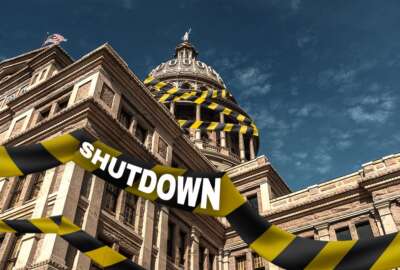At TSA and across DHS, employees prepare to work without pay under government shutdown
"The employees are upset that they're going into this again." Staff at TSA and other DHS components are preparing to go to work without pay."
Tens of thousands of employees across the Department of Homeland Security are preparing to show up to work with the prospect of not receiving a paycheck under a government shutdown.
Nearly three-quarters of the DHS workforce, more than 185,000 people, will be required to work unpaid through a shutdown. DHS and the Defense Department make up the vast majority of the federal government’s “excepted” workforce that will be required to work without pay.
DHS’s excepted workforce includes airport screeners at the Transportation Security Administration, where 59,000 out of a total 62,000 employees are considered essential employees.
While federal employees receive back pay when a government shutdown ends, most transportation security officers live paycheck-to-paycheck, according to Johnny Jones, a TSO at Dallas-Fort Worth Airport and secretary treasurer for Council 100 at the American Federation of Government Employees (AFGE).
“People are going to make quick decisions on whether they’re going to be able to continue to go to work for financial concerns, or they’re going to have to pick up part time jobs somewhere else,” Jones said. “There are going to be a lot of considerations.”
He pointed back to the 35-day government shutdown in 2018-2019, the longest in U.S. history. TSO’s had to continue working then as well.
“The employees are upset about the fact that they’re going to go into this again,” Jones said. “They also know that this could be a long shutdown.”
In 2018, TSO’s still received a full paycheck after the initial two weeks because of when the shutdown began. This time around, though, Jones said TSO’s are only set to receive a week’s worth of a pay when the next check is due on Oct. 14.
“The impact of this shutdown, is very unique to the fact that you’re only going to receive half of a check on the next paycheck,” Jones said. “So the impacts are going to be immediate. And so people are going to start making decisions quicker than they did last time during the shutdown.”
A TSA spokesman said an “extended shutdown could mean longer wait times at airports,” pointing back to the 2018-2019 shutdown, when TSA faced staffing issues due to more officers calling out as the shutdown dragged on.
“A similar scenario could play out again if the shutdown lasts for an extended period,” the spokesman said. “It’s very, very hard for anybody to go for 20 days, 30 days, 40 days or longer without receiving a paycheck. It impacts the ability of people to get to work, to pay to put gas in their vehicles, to pay for parking. It impacts their ability to pay the individuals that provide care for their children.”
The shutdown will also curtail the onboarding of new employees. “This is particularly problematic ahead of the holiday travel season, where more TSA officers will be needed to screen travelers,” DHS said in a factsheet released this week.
Jones said an extended shutdown will inevitably lead to morale and potential attrition problems at TSA. The agency had been making recruitment and retention gains this year due to a historic pay increase that brought TSA employees in line with most other federal workers.
“You’re expected to show up for work, you’re expected to show up happy, and you’re expected to show up without pay,” Jones said. “We’re sworn officers of the government. We uphold the Constitution. We enjoy being federal public servants, but we just don’t enjoy being political pawns in the middle of some game.”
Bill would keep paying some CBP, ICE employees
Meanwhile, Republican lawmakers have put forward a bill to continue paying border patrol employees at Customs and Border Protection, as well as Immigration and Customs Enforcement agents through a government shutdown.
DHS says about 19,000 border patrol agents and 25,000 field operations officers work during the shutdown without pay. DHS’s contingency plan shows about 16,700 out of ICE’s 20,000 employees will continue to work during the shutdown, although at least some of those employees will be paid because their funding comes from sources other than appropriations.
Some operations at the Federal Law Enforcement Training Centers (FLETC), including “some basic training and most advanced training,” would stop under a shutdown. DHS says FLETC training personnel also won’t be able to travel to conduct expert training, while programs for state, local, and tribal agencies will be suspended. “This will impact law enforcement readiness across the country,” DHS said.
The shutdown will also cause “hardship” for enlisted personnel at the Coast Guard, DHS’s factsheet said. Unlike their civilian counterparts, military personnel at the Coast Guard can’t apply for interim aid like unemployment benefits. And unlike other members of the armed services, DHS says Coast Guard members can’t be paid until a specific appropriations bill is passed.
Copyright © 2025 Federal News Network. All rights reserved. This website is not intended for users located within the European Economic Area.
Follow @jdoubledayWFED






